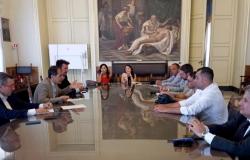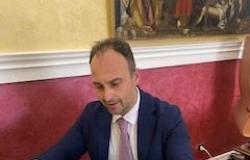Two “heavy” awards at Venezia 80, best screenplay and best female performance in the Orizzonti section. It took a while to see it arrive in the room El Paraíso, the beautiful film by Enrico Maria Artale which tells of a morbid mother-son relationship, small drug trafficking professionals in a surreal Fiumicino (also featuring the music of Nicolas Jaar). It has been in cinemas since 6 June, and we hope it will be among the titles to enjoy the promotions required by the government, from Cinema in festa to Cinema Revolution. Protagonist Edoardo Pesce, also partly responsible for the genesis of El Paraísoas the director himself told me, during a conversation on the London-Paris axis, where Enrico finds himself for reasons that he reveals at the end of the interview.
Enrico, where does the story come from? From what I know, the idea is shared with Edoardo.
Meanwhile, it was born from our friendship. We met on my first film, The third half, in which Edo had a small role. We became very good friends, and every now and then we said to each other: “It would be nice to make a film together.” In the meantime we met up to fool around, and in reality this is how the suggestion of the film came out. We were at my house, completely drunk, at dawn, talking crazy. Edoardo is a powerhouse of ideas, he always tells you a thousand things that often go in one ear and out the other. Instead, in that case, talking about a mother-son relationship, which I experienced in a complex and visceral way more than him, the light bulb went on for me. And it was originally supposed to be the story of an Elvis fanatic who wanted to take his mother to Graceland, cool, but a different horizon. However, the idea behind this difficult mourning process intrigued me and I added my life experiences to it, that of a long trip to Colombia, where I had established very strong contacts with that country. And, since there has always been a journey in the idea, the core of the film was born from that chat.
Edoardo Pesce is Julio. Photo: I Wonder Pictures
The film talks about a triple addiction, that between mother and son, another towards the substance and the third which makes El Paraíso an almost Ferrerian film, a variation on the theme of Meat. Did you think about it while you were writing?
No, not directly, let’s say I had this obsession with physicality, or even I would say, to push it back even further, with physiology. This is why there is also lots and lots of food in the film. Not that it was programmatic, but at a certain point I realized that I kept writing scenes where we ate, drank and took drugs, all at the same time. I was obsessed with all the hiring processes, and this pushed me to have the camera very close to their bodies, their hands, their bellies, not just their faces. There is a lot of physical contact between the characters, obviously in the dance, but not only. It is never a sexual contact, because I was interested in making a film in which sex was a continuous allusion, a crypto-incest, a repressed desire towards the mother, towards the son, towards the girl who arrives.
You’ve found the chemistry of the perfect lead couple. Margarita Rosa de Francisco is fabulous. Where did you find it?
This is a long story too. The film took a very long time to write, seven years, between Covid, difficulties in financing it and everything else. And for half of these years I wrote keeping in mind this actress who had introduced me to a Colombian, showing me videos on YouTube of some kind of web series she had recently done, because Margarita had enormous fame in her youth thanks above all to soap operas in Colombia and Mexico. Then she did little, she didn’t have the opportunity. Watching these videos in which she plays a glorious actress, I became interested in her character and wrote thinking of her as a reference for years, without knowing if I could have her. We contacted her, she was enthusiastic, Covid created problems for us, but she gave her more time to learn Italian, because she didn’t know a word, just as Edoardo didn’t know a word of Spanish. I wanted to create this language that was a mix between Spanish and Roman actually, also because I was amused by the fact that Roman resembles Spanish more than Italian itself. I wanted them to speak their own language that would convey this bubble in which they live. When she arrived in Rome she spoke Italian, but she didn’t yet have the character, also because she is a very elegant woman, not someone who lived for forty years in Fiumicino. Those four weeks of rehearsals in which Edoardo and Margarita went to dinner together almost every evening to share and talk were decisive. We spent a lot of time in the house where we shot, to make it truly their home. There was total immersion work. A few days before starting filming, during a rehearsal session, Edoardo had this somewhat authoritarian attitude, he gave directions, and there she reacted, she got angry, she couldn’t take it anymore. She started screaming, being a little in the scene and a little in reality. And there I understood that we had found the chemistry you were talking about, something had happened that wasn’t foreseen in the scene but that had established the relationship, because Edoardo had also entered the character.
Speaking of the settings, obviously there are echoes of Pasolini, Fiumicino, the Fishermen’s Village, but in reality it could be the Po delta or Castel Volturno, and this mixed language also contributes to making the atmosphere much more universal and less limited and defined .
I wanted to walk away, not out of bias. I thought it was important that they lived in a sort of phantasmagoria, a corner of Colombia nostalgically reconstructed at the mouth of the Tiber, an elsewhere as you said. The river as a symbolic element, but not necessarily the Roman river, water as a transition element, and hence also the importance of their little boat. Every detail was important.
Probably if they had gone to Graceland they would have gotten there by sailing the Mississippi.
Of course, absolutely. The river is an enormous literary topos, the pinnacle of the search for origins, going upstream. In the first versions of the script this was more developed, even in the Colombian part there was a trip on the river, the Rio Magdalena, the most important in Colombia, and the character of her mother is called Magda. Then all this sublimated, but the importance of the river remained, of those small boat transfers they make. The second reason I told you was to work on this hybridized identity. Today there is so much emphasis on identity in its nationalistic deformations, as if it were something to be preserved. But our history, and not only that of Italians, is a history of hybridized identities, and today it is even more true for multiple reasons, starting from migratory flows, made possible by a different way of travelling. This is a story of illegal immigration and immigration but a different one, because Magda is indeed an illegal immigrant, but thanks to drug trafficking. This is what we imagine. The opportunity to talk about hybrid identities seems to me to be the most interesting way to also evolve Pasolini’s scenarios. In reality, those neighborhoods are home to people who come from all over the world: South Americans, Romanians, Africans. This melting pot is a richness, even in musical mixes. I was interested in telling all this without having to make a social film in which there is a certain naturalism in the description of social environments. I wanted to transfigure it into a universal story.
El Paraíso it’s also difficult to classify into a genre, and from my point of view that’s a good thing, because in some ways it’s a good noir, but also a family drama with horror nuances. It is a fluid story, which continually changes and which is also why it has had international recognition in Venice.
I really like this thing you tell me, it also intrigues me with respect to other future projects. This fluidity, which mixes genres or tensions and allusions to genres without being able to frame the film in one in particular, seems very contemporary and fascinating to me. It also seems to me to be a natural way of playing with the viewer, telling a story without pigeonholing it and without having the rules dictated by today’s algorithms. It’s a difficult choice sometimes in writing, because in an instant something can take your hand too far in one direction and you have to keep it. It’s like having a lot of reins in your hands, but it’s a path to follow.

The definition of a genre also depends on the look: atmospheres, lights and colors change depending on the mood of the characters and the twists and turns of the story. All this envelops the story and helps us get inside it.
You know, I love Cassavetes, to talk about a classic, but also Derek Cianfrance, who is contemporary but who, in a certain sense, pursues that type of narrative and staging. But even authors like James Gray and Michael Mann have always made choices of this type, infusing the film with atmospheres deriving from the emotions of the characters. A very American thing which however also developed the Nouvelle Vague and which has continued to this day. The same Anatomy of a fall it’s a family drama mixed with a thriller and a procedural film.
This is what Jacques Audiard has always done.
Audiard is one of my myths. I’m in Paris right now because I’m filming the series based on The Prophet, I’m already editing and I’m exhausted, but it’s a beautiful project. Audiard is a director who has established himself in the tradition of French polar, but also reinvented many things.
Apart from the fact that I absolutely didn’t know that you were working on this series, thinking back to films like On my lips And All the beats of my heart, they are all mélo that transform into polar that transform into something else. Furthermore, if you think about it for a moment, The Prophet it’s also a film that perhaps you were unconsciously inspired by.
I love it and it’s a constant inspiration to me on the film I’m writing now, so let’s say it speaks to me. But doing this series I watched it again I don’t know how many times The Prophet. And by studying it, the one with Audiard’s cinema has now become an internal dialogue.







